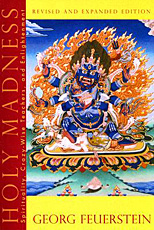"Enlightenment is the shattering of all mental constructions about existence, including the notions of emptiness and chaos or fullness and harmony. It is awakening from the dream in which we mistake our metaphors for the real thing. As the psychiatrist and Zen practitioner Hubert Benoit put it: 'At a single stroke I have completely crushed the cave of phantoms.' The phantoms are the curious mental creations with which we surround ourselves and through which we live a mediated existence.
"Holy madness, or crazy wisdom, is stated to be in the service of such an awakening, and it has no value or purpose beyond that. Unlike conventional wisdom, it is not meant to create a higher 'order,' a new harmony, that is, a better model of reality. On the contrary, crazy wisdom has the sole function of disrupting our model-making enthusiasm, the phantasmagoria of the mind. It is enlightened iconoclasm. It calls into question all our questions and answers to life's challenges and problems. Crazy wisdom does not propose to be an answer or a solution. If anything, it is radical questioning. In this sense, the crazy-wise adept is the ultimate scientist, whose investigation is so rigorous that it brooks no conventional answer whatsoever. His or her 'science,' however, is the science of Divine Ignorance, which means living out of the plenum-void that is Reality.
"Another way of putting this is that the advanced crazy-wisdom master, especially if he or she is an enlightened adept, lives a life of sheer spontaneity. The emphasis is on the qualifying adjective 'sheer,' because the adept's 'naturalness' must be carefully distinguished from the impulsiveness of the child and of the emotionally labile adult, as well as from the kind of spontaneity that is pursued by different humanistic therapies and orientalizing 'be here now' approaches. Of course, this sheer spontaneity does not exclude the ability to think rationally — to plan ahead or proceed in a systematic fashion. The enlightened adept may well be an accomplished philosopher and scholar, as was the case with the tenth-century Indian master Abhinava Gupta. But even careful thought and forethought occur in such a being on the basis of ego-freedom and hence as a spontaneous flow."
